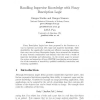1087 search results - page 38 / 218 » Exploiting Description Logic Reasoners in Inductive Logic |
102
click to vote
SAC
2010
ACM
15 years 8 months ago
2010
ACM
A concept learning framework for terminological representations is introduced. It is grounded on a method for inducing logic decision trees as an adaptation of the classic tree in...
125
click to vote
AGP
2003
IEEE
15 years 6 months ago
2003
IEEE
Abstract The Semantic Web (SW) can be seen as abstract representation and exchange of data and metadata. Metadata is given in terms of data mark-up and reference to shared, Web-acc...
105
click to vote
TARK
1998
Springer
15 years 5 months ago
1998
Springer
: Salmetintroduced a notion of hypothetical knowledge and showed how it could be used to capture the type of counterfactual reasoning necessary to force the backwards induction sol...
120
click to vote
DLOG
2006
15 years 2 months ago
2006
Fuzzy Description Logics have been proposed in the literature as a way to represent and reason with vague and imprecise knowledge. Their decidability, the empirically tractable an...
IAT
2007
IEEE
15 years 7 months ago
2007
IEEE
Agent training techniques study methods to embed empirical, inductive knowledge representations into intelligent agents, in dynamic, recursive or semi-automated ways, expressed in...

